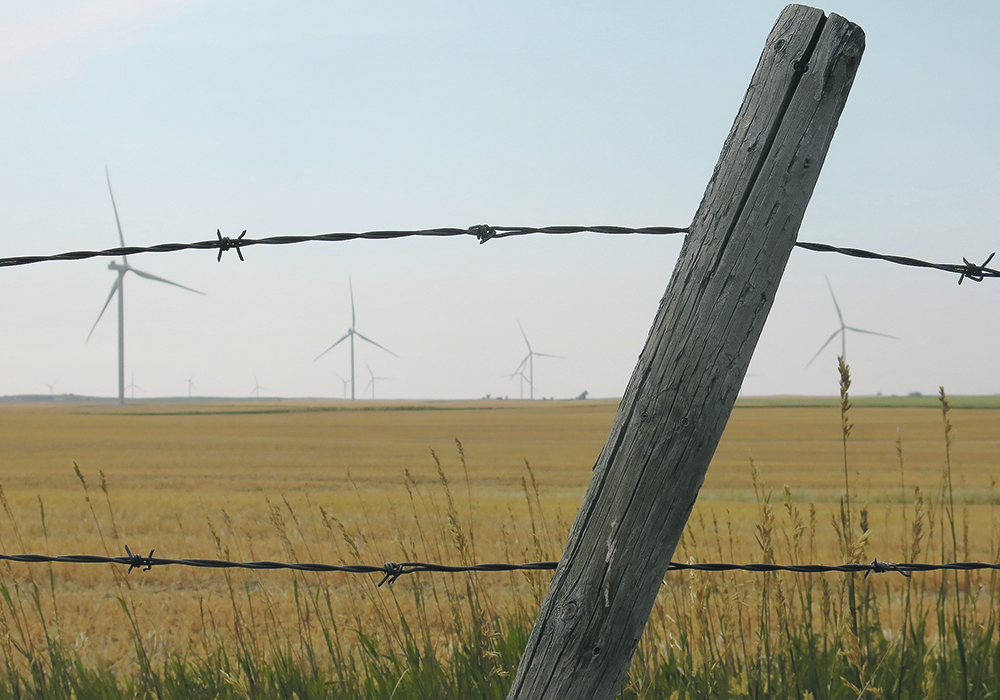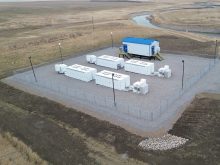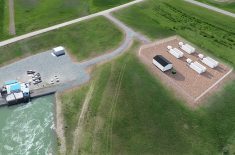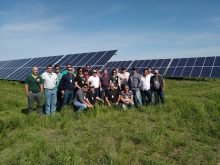Alberta says regulatory approval pause will allow it to consider how landowner rights fit into the renewable energy boom
Following a surprise announcement by the Alberta government, no new regulatory approvals for wind or solar projects that are more than one megawatt in size will be issued for the next six months as of August 2023 as it reviews the state of the industry.
Provincial government officials have said alternative energy developments have happened too quickly. Others say that’s a matter of perspective.
The Alberta government deregulated the energy market in 1996, passed legislation with the expressed intention of building transmission lines for renewables in 2009 and developed the regulatory framework for the industry.
Premier Danielle Smith has questioned the value of Alberta’s multibillion-dollar renewable industry in the past, even as renewable energy supporters say it has created thousands of well-paid jobs in the province when the traditional oil and gas energy sector floundered with unpaid bills.
During this spring’s Rural Municipalities of Alberta convention, Smith raised questions about the value of alternative energy developments.
“I wonder if someone wants to get to the mic and ask me what I think about building out 20,000 megawatts of solar panels on prime agricultural land,” she said to applause.
Less than five months later, that question appears to have been answered.
The move comes in contrast to her conservative predecessors, starting with Ralph Klein who paved the way for renewable development by deregulating the energy market, allowing for private investment to spur the sector.
Former premier Ed Stelmach’s government backed the legislation for building a vast network of transmission lines, which criss-crosses southern Alberta and was developed to move energy produced by wind and solar. And, most recently, Jason Kenney’s UCP government took the position that as long as renewables weren’t seeking government funding, build away.
The current government said it instituted the pause so it can become better informed about renewable energy developments on specific types of agricultural and environmental lands, their impacts on landscapes, reclamation processes and how it fits into grid reliability.
The review will also initiate discussions on whether crown land, which has so far been banned for renewables, should be opened up for development.
Cypress County in Alberta’s southeast has been the epicentre of renewables and it has not come without controversy, which was encapsulated in a recent council meeting.
Councillor Robin Kurpjuweit broached the topic of what constitutes “prime agricultural land” during that meeting, which featured discussions on the latest proposed renewable project.
“If we classify all land as prime, we start to lose our voice,” said Kurpjuweit, indicating possible issues for development if all agricultural land is deemed as such. “What is the land we would stand behind?”
That comment sparked a debate with councillor Dustin Vossler saying there is weak grazing land south of the Cypress Hills that could host solar projects while still allowing pasture use by livestock rather than good dryland farming areas.
“Grazing works with these projects. They can still work and they can graze between (the panels). It’s an option,” said Vossler. “Sheep, cows, whatever. If they wreck the panels, I don’t care, but they say it can be done.”
Vossler stated there is poor performing farmland in the county along with badlands and alkaline sloughs that would be more appropriate for renewable projects.
Kurpjuweit also brought up property rights.
Unlike oil and gas development, Alberta landowners can reject any renewable development on their land and request a remediation plan or bond before construction takes place.
“I think we may need to do a little more work on being a little bit more articulate on where, as a county, we feel it’s appropriate for where we put these kind of things so we’re not just opposing everything,” he said.

During a media availability, Alberta environment minister Rebecca Schulz said landowner rights are one area to be examined during the pause on renewable energy development.
“We have the opportunity right now to put parameters in place to make sure we have reliability and sustainability and affordability in our grid, but also address those concerns that have been raised around liability and reclamation,” she said, adding Alberta continues to be “open for business.”
Mike Montague, the Alberta representative for the Christian Labour Association of Canada that negotiates for an estimated 1,000 renewable energy sector workers in the province, said the decision has left the future of the industry up in the air.
“We don’t know what the impact is going to be on our membership or when it’s going to hit,” he said. “We’re not happy about it for our members, and workers in renewables in general, to have a moratorium placed on that work. We think it’s going to impact them; we just don’t know when.”
Montague said those who work in the industry constructing renewable projects routinely earn wages above $100,000, despite entering the business with basic skills, and produce a positive economic spinoff to rural communities.
“People that make good salaries working on this and can supply a reasonable living to their family and put food on the table, that’s the thing that really is a heartbreaker about this and I don’t think it’s often thought of politically,” he said.
“And you wish it would, you really do, when they consider these things and the impact it will have in the near and mid-term.”
Montague said it’s anticipated there will be work for the next two years from projects that have received regulatory approval prior to the government’s pause, but that will depend on whether they wish to move forward with them under the current uncertainty.
The NDP critic for energy and climate, Nagwan Al-Guneid, lambasted the decision to pause renewable developments, calling the move reckless and done without any consultations with industry.
“This decision is bad for business, full stop,” she said during a media availability following the government’s announcement. “This will have a chilling investment effect in Alberta.”
The government says 15 renewable projects currently in line for regulatory approval will be impacted by the pause.
















